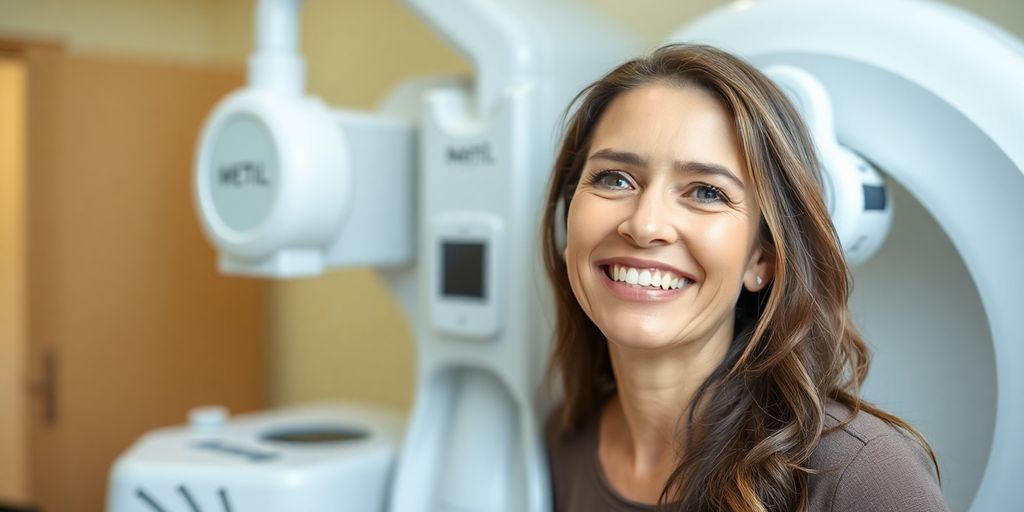Getting a mammogram is an important step in taking care of your health, especially for women over 40. However, many people wonder where they can get this screening without needing a doctor’s referral. This article will guide you through the essentials of mammograms, where to find them, and how to access them easily and affordably.
- Discover the Best Non Veg Hotels Near Me for an Unforgettable Dining Experience
- Where to Sell Copper Near Me: Top Local Options for Cashing in Your Scrap Metal
- Discover Where to Recycle Car Seats Near Me: A Comprehensive Guide
- Discover the Best Non Veg Hotel Near Me for an Unforgettable Dining Experience
- Who Buys Watches Near Me? Discover Local Buyers and Best Options
Key Takeaways
- Mammograms are vital for early detection of breast cancer, especially for women over 40.
- You can find mammograms at hospitals, breast centers, and even mobile units that travel to communities.
- Many facilities allow you to schedule a mammogram without needing a doctor’s referral if you meet certain criteria.
- Financial help is available through programs and charities for those who cannot afford the cost of a mammogram.
- Don’t hesitate to ask questions when scheduling to find the best options available for you.
Understanding Mammograms and Their Importance
What is a Mammogram?
A mammogram is an X-ray of the breast used to check for signs of breast cancer. It helps doctors find abnormal changes in breast tissue before symptoms appear. Regular mammograms can catch issues early, making treatment easier and more effective.
You are viewing: Exploring Options: Where Can I Get a Mammogram Without a Referral Near Me?
Why Regular Mammograms are Crucial
Getting mammograms regularly is important because:
- They can detect breast cancer early when it’s most treatable.
- They help monitor changes in breast tissue over time.
- They can reduce the risk of dying from breast cancer.
Types of Mammograms: Screening vs. Diagnostic
There are two main types of mammograms:
- Screening Mammograms: These are routine checks for women with no symptoms. They help find cancer early.
- Diagnostic Mammograms: These are for women who have symptoms or have had abnormal results in a screening. They provide a closer look at the breast tissue.
| Type of Mammogram | Purpose | Recommended For |
|---|---|---|
| Screening Mammogram | Routine check for early detection | Women aged 40 and older |
| Diagnostic Mammogram | Further investigation of symptoms | Women with lumps or other concerns |


Regular mammograms are one of the most important tools doctors have to help screen for and diagnose breast cancer. They play a vital role in women’s health and can save lives.
Finding Mammogram Facilities Near You
Hospitals and Breast Centers
Mammograms can be done at various places, including hospitals and specialized breast centers. These facilities often have the latest technology and trained staff to ensure accurate results. Here are some options:
- Local hospitals
- Dedicated breast health centers
- Community health clinics
Imaging Centers and Clinics
You can also find mammograms at imaging centers and clinics. These places focus on diagnostic imaging and may offer more flexible scheduling. When looking for a screening mammogram near me, consider:
- Standalone imaging centers
- Urgent care clinics with imaging services
- Women’s health clinics
Mobile Mammography Units
Another convenient option is mobile mammography units, often called "mammovans." These units travel to different locations, making it easier for you to get screened. They usually provide:
- On-site mammograms
- Flexible scheduling
- Community outreach programs
Finding a mammogram facility nearby is essential for your health. Don’t hesitate to reach out to local resources to get the care you need!
How to Get a Mammogram Without a Referral
Eligibility Criteria for No-Referral Mammograms
Read More : Discover the Perfect Place for Couples Near Me: Top Romantic Destinations to Explore
To get a mammogram without a referral, you typically need to meet certain criteria. Here are some key points to consider:
- Age: Women aged 40 and older can often schedule a screening mammogram without a doctor’s referral.
- No Symptoms: If you have no breast symptoms or concerns, you are more likely to qualify.
- Insurance: Check if your insurance covers self-referrals for mammograms.
Steps to Schedule a Mammogram
Follow these steps to book your mammogram:
- Find a Facility: Look for local hospitals, breast centers, or imaging clinics that offer mammograms.
- Call to Schedule: When you call, say, "I want to schedule a mammogram."
- Ask About Costs: Inquire if they offer free or low-cost options, especially if you are uninsured.
What to Expect During the Appointment
During your mammogram appointment, you can expect the following:
- Preparation: You will be asked to remove clothing from the waist up and wear a gown.
- Procedure: The technician will position your breasts for the X-ray, which may feel uncomfortable but is quick.
- Results: You will usually receive results within a few days.
Remember, every woman counts when it comes to breast health. Don’t hesitate to seek out resources for free or low-cost mammograms if needed!
Financial Assistance and Low-Cost Options
Insurance Coverage for Mammograms
Many health insurance plans cover mammograms, especially for women over 40. Here are some key points:
- Screening mammograms are usually covered every one to two years.
- Diagnostic mammograms may have different coverage rules.
- If you have Medicaid, you can often get a mammogram at no cost.
National and State Programs
Several programs help women access low-cost or free mammograms:
- National Breast and Cervical Cancer Early Detection Program (NBCCEDP): This program helps low-income women get screenings and diagnostic services.
- Susan G. Komen Foundation: They offer resources and may help you find low-cost options.
- Local health departments: Many states have programs that provide free or reduced-cost mammograms.
Local Charities and Organizations
You can also check with local charities for assistance:
- American Cancer Society: They provide information on free mammograms.
- Planned Parenthood: While they don’t offer mammograms, they can refer you to low-cost facilities.
- YWCA: They often have programs for free or low-cost mammograms, especially during Breast Cancer Awareness Month.
If you need help finding low-cost options, call the Komen Breast Care Helpline at 1-877 GO KOMEN (1-877-465-6636) Monday – Thursday, 9 a.m. – 7 p.m. ET and Friday, 9 a.m. – 6 p.m. ET.
Overcoming Common Barriers to Mammogram Access
Many women face challenges when trying to schedule a mammogram. Limited facilities, long travel distances, and strict work schedules can make it tough to get this important screening done. Here are some common barriers and ways to overcome them:
Addressing Cost Concerns
- Ask about sliding-fee scales: Some hospitals offer discounts based on your income.
- Inquire about cash pay discounts: You might get a lower price if you pay upfront.
- Explore payment plans: This allows you to spread the cost over several months.
Handling Scheduling Issues
- Check for cancellation lists: If appointments are full, ask to be added to a list for any last-minute openings.
- Look for nearby facilities: If one place is booked, see if others can fit you in sooner.
- Consider mobile mammography units: These can come to your area, making it easier to get screened.
Navigating Transportation Challenges
- Ask about transportation assistance: Some organizations may help with rides to appointments.
- Use public transport options: Research bus or train routes that can take you to the facility.
- Carpool with friends or family: This can make the trip more enjoyable and less stressful.
Remember, getting a mammogram is crucial for your health. Don’t let barriers stop you from taking this important step!
Additional Resources and Support
National Breast and Cervical Cancer Early Detection Program
This program helps women get access to important screenings like mammograms. It aims to find breast and cervical cancer early when treatment is most effective. Many states offer this program, and it can help those who may not have insurance.
Susan G. Komen Foundation
Read More : Discover the Best Women Dress Shop Near Me for Stunning Styles and Affordable Prices
The Susan G. Komen Foundation provides a variety of resources for breast cancer patients and survivors. They offer:
- Support groups for emotional help.
- Educational materials about breast health.
- Financial assistance for those in need.
American Cancer Society
The American Cancer Society has many programs to support patients. Some of their services include:
- Free rides to treatment appointments.
- Free lodging during treatment.
- A 24/7 cancer helpline for questions and support.
These resources can make a big difference in your journey. Don’t hesitate to reach out for help.
Summary Table of Resources
| Resource | Services Offered |
|---|---|
| National Breast and Cervical Cancer Early Detection Program | Screenings, education |
| Susan G. Komen Foundation | Support groups, financial aid |
| American Cancer Society | Rides, lodging, helpline |
Final Thoughts on Finding a Mammogram Without a Referral
In conclusion, getting a mammogram without a referral is possible and can be done in various ways. It’s important to know where to look and what questions to ask. You can reach out to local hospitals, imaging centers, or even mobile units that offer screenings. If cost is a concern, many organizations provide low-cost or free options for those who qualify. Remember, taking care of your health is crucial, and finding the right resources can make the process easier. Don’t hesitate to ask for help or seek out information to ensure you get the care you need.
Frequently Asked Questions
What is a mammogram?
A mammogram is an X-ray of the breast that helps doctors find any signs of breast cancer early.
Do I need a referral to get a mammogram?
No, you can often schedule a mammogram without a doctor’s referral, especially if you are over 40.
How often should I get a mammogram?
Women over 40 should get a mammogram every 1 to 2 years, or as recommended by their doctor.
What if I can’t afford a mammogram?
There are programs and organizations that provide free or low-cost mammograms for those who qualify.
What should I expect during a mammogram?
During a mammogram, your breast will be placed between two plates to take X-ray images. It might feel uncomfortable but is usually quick.
Can I get a mammogram at a mobile unit?
Yes, some areas have mobile mammography units that travel to offer screenings in convenient locations.
Soure: https://herego.net
Category: near me


